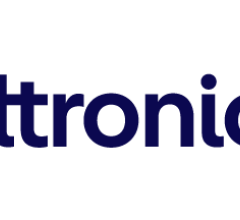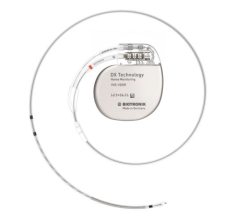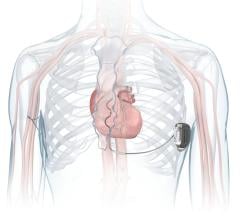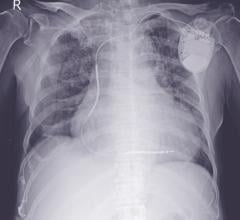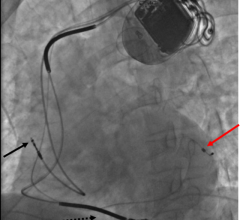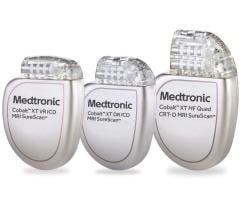

The Medtronic Viva Quad XT CRT-D with AdaptivCRT technology

The Medtronic Viva Quad XT CRT-D with AdaptivCRT technology
August 11, 2014 — Medtronic announced it has received U.S. Food and Drug Administration (FDA) approval for the Attain Performa model 4298 quadripolar lead, and the Viva Quad XT and Viva Quad S cardiac resynchronization therapy defibrillators (CRT-D). The quadripolar lead and devices will be broadly available to physicians in mid-September.
With 16 pacing configurations and shorter spacing between the two center electrodes, the Attain Performa model 4298 left-heart lead provides additional options for physicians to treat different patient anatomies. The new quadripolar lead reduces the incidence of phrenic nerve stimulation (PNS), a potential side effect that results in muscle twitching, hiccups or shortness of breath. The Viva Quad XT device is equipped with the proprietary AdaptivCRT feature, which preserves normal heart rhythms and automatically adjusts to patients’ needs to customize therapy. The system includes VectorExpress technology, which reduces lead programming time to two minutes by providing physicians with clinically actionable information to help them select optimal pacing configurations for each patient.
Quadripolar leads help physicians optimize CRT delivery. The Attain Performa lead addresses the clinical challenges that can compromise lead position, offering implanting physicians more options to maintain lead position and optimize CRT. The model 4298 lead has a canted shape and steroid on all four electrodes for lower pacing thresholds.
“Compared to conventional leads, the additional pacing configurations offered by this system provide implanting physicians more options to optimize CRT delivery, which results in better patient care. Likewise, the narrow-spaced bipole helps avoid phrenic nerve capture,” said George H. Crossley, M.D., FACC, FHRS, associate professor, Vanderbilt Heart and Vascular Institute, Nashville.
The AdaptivCRT algorithm is the first significant advance to improve patient response rates to CRT since the advent of the therapy more than 10 years ago. The benefits of the algorithm were demonstrated in the Adaptive CRT trial, a prospective, multicenter, randomized, double blind clinical trial. Key findings from the original trial, sub-analyses and economic models included:
- For patients with normal AV conduction, AdaptivCRT showed an increase in CRT response rate of 12 percent at six months;
- Patients with AdaptivCRT demonstrated a 21 percent reduction in heart failure hospitalizations as compared to historical CRT trials;
- Patients with the AdaptivCRT technology demonstrated a 46 percent reduced risk of AF8, and a 61 percent lower risk of AF-related problems; and
- AdaptivCRT demonstrated a reduction in 30-day hospital readmissions for heart failure of 47 percent.
“Medtronic continues to advance the care of heart failure patients, as it has since it first commercialized CRT in the United States. With the previously available AdaptivCRT algorithm, and now the new Attain Performa canted lead and Viva Quad devices, Medtronic is delivering a top-notch system for patients with heart failure,” said David Steinhaus, M.D., vice president and general manager, Heart Failure, and medical director for the Cardiac Rhythm and Heart Failure Management business at Medtronic.
For more information: www.medtronic.com


 January 13, 2026
January 13, 2026 

